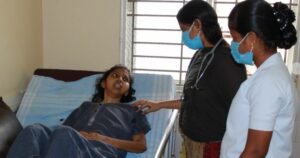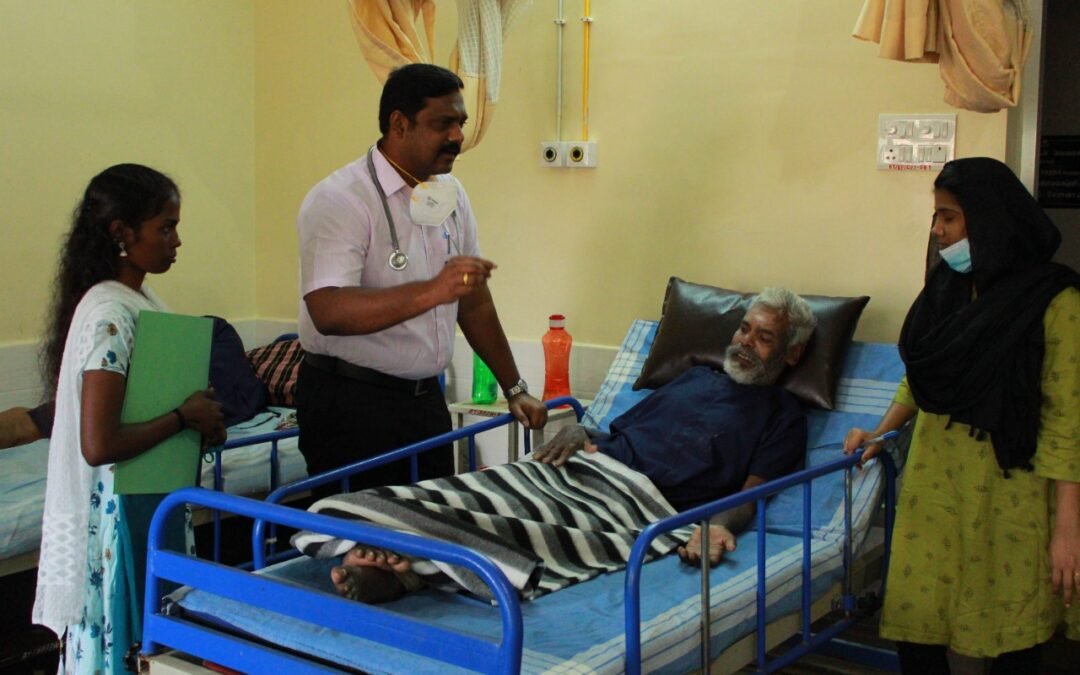Read in : தமிழ்
They had come from ordinary backgrounds but gone on to become doctors at a corporate hospital in Madurai, but despite their success they felt a void in their lives. They realised that they had become too involved in the professional aspects of their occupation and in making a living, that they were not giving anything back to society. So, the medical practitioners came together to start a small trust in 2014 to serve poor people. Now, their initiative has grown into a full-fledged hospice facility in a suburb of the city. Nethravathi Pain, Palliative Care and Rehabilitation Center has served more than 300 abandoned destitute people in all these years.
Doctors R Balagurusamy, R Amuthanilavan, P Venkatesh, S Sabarimanikandan, S Srividya Manjunath, Prabhuram Niranjan and C Satheesh studied MBBS in various government colleges. After graduating in 2008, they met in the corporate hospital where they were employed and became friends. Over the course of time, the friends felt that they were not doing enough for society as doctors. So, after their duty hours, they began running a small clinic at Mahatma Gandhi Nagar. They provided medical care either free or at nominal fees for the poor people in and around the locality. They also used to conduct medical camps in nearby villages.
In 2014, they started Aishwaryam Trust to coordinate their charity work. They realized that there was a greater need to start a home for palliative and pain management care. They started a hospice in a rented building in 2015. Initially, they admitted 20 people who were terminally ill.
Moved by their initiative, retired government employees Janardhanan and Jalaja donated 27 cents of land at Vilachery in Madurai’s suburbs. A new 50-bedded hospice facility was constructed in this land in 2016 and was named Nethravathi Pain Palliative Care and Rehabilitation Center.
The hospice has catered to more than 300 people. It has helped 50 terminally ill people to have a peaceful death, and has carried out the cremation of 30 people whose bodies nobody claimed.
With the help of social workers, the doctors began rescuing the destitute and dying people from the streets. Now, they receive patients referred by social workers and organizations.
Take the case of 65-year-old Murugaiyan. He was living alone after his wife separated from him. After he met with an accident two years ago, there was no one to take care of him. He was referred from Villupuram and he is now at the hospice. “Most of our residents are orphans and abandoned. Red Cross and other charity organizations who rescue abandoned people from the streets send them here,” says Dr Balagurusamy.
Seven years later, the hospice has catered to more than 300 people. It has helped 50 terminally ill people to have a peaceful death, and has carried out the cremation of 30 people whose bodies nobody claimed.
“We rescue the destitute and dying from the streets but the biggest challenge is where to send them. Nethravathi is one of the few facilities we find in the city,” says Manikandan, a social worker from Madurai.

A doctor and a nurse attend to Mohanarani, 35, who suffered seronegative arthritis in 2005 and was crippled and bedridden for the last two years. Her condition has improved. She is now recovering slowly.
Some of the rescued recover over time due to adequate medical care and nutrition. Mohanarani, 35, from Chennai suffered seronegative arthritis in 2005 and was crippled and bedridden for the last two years. Her husband abandoned her and she was admitted to the center by those who saw her pitiable condition. Mohanarani’s condition has improved. She is now recovering slowly. The doctors have appealed to donors to help Mohanrani’s 19-year-old daughter studying in a Madurai college.
The doctors still work in the corporate hospitals. A team of staffers including medical professionals are employed in Nethravathi Pain Palliative Care and Rehabilitation Center. The doctors take turns to visit the facility and provide medical care. The home provides palliative care and pain management for the terminally ill and rehabilitation for the inmates who suffer from stroke.
They also provide medical services to a number of old age homes in the city and conduct medical camps in the villages around Madurai.
During the initial years, the doctors were spending from their pockets to run the hospice but they are able to get donations now. “But we have a constant fear of running short of funds. We don’t have any big CSR (corporate) funding for the facility. It takes Rs 4 lakh a month to provide all facilities like diapers and medicines for the inmates,” says Dr Balagurusamy.
During the initial years, the doctors were spending from their pockets to run the hospice but they are able to get donations now. “But we have a constant fear of running short of funds. We don’t have any big CSR (corporate) funding for the facility. It takes Rs 4 lakh a month to provide all facilities like diapers and medicines for the inmates,” says Dr Balagurusamy.
Shyam Gupta of Shakti Cords Pvt Ltd, an industrialist from Madurai, has helped them construct another 22-bedded facility in the premises. The inauguration of the facility was delayed due to Covid-19. The pandemic and lockdown were testing times for the facility and the doctors. “We somehow managed with god’s grace and the generous donations of people in the nick of time,” Dr Balagurusamy says.
Another problem they face is stigma. As there is little awareness of palliative care and pain management or hospice care in short, people accuse them of not healing the inmates, and leaving them to die. Until they were able to build their own facility in Vilachery, Nethravathi Center faced many troubles. They were evicted from several premises because of people’s misconception of what a hospice is.
“Even now, people think we are running an old age home. It is not an old age home, it is a hospice and a place where people can die with dignity,” explains Dr Balagurusamy.
The facility follows every legal procedure when an inmate dies. The authorities are duly notified and permissions are sought for cremation or burial if no relative claims the dead body.
Another common issue they face is of families trying to dump their sick and dying relatives there, whereas the hospice is meant for those who have no family and are destitute. Recently, a man admitted an elderly person into the center. He claimed that the patient was an acquaintance and that there was no one to take care of him. A few weeks later, when the patient recovered, he revealed that it was his own son that admitted him at the center and left. The center is planning to send legal notices to such families.
Despite the problems, the team of doctors is determined to augment their hospice into a 100-bedded facility. They are optimistic that they can pull it off in the coming years.
Read in : தமிழ்











